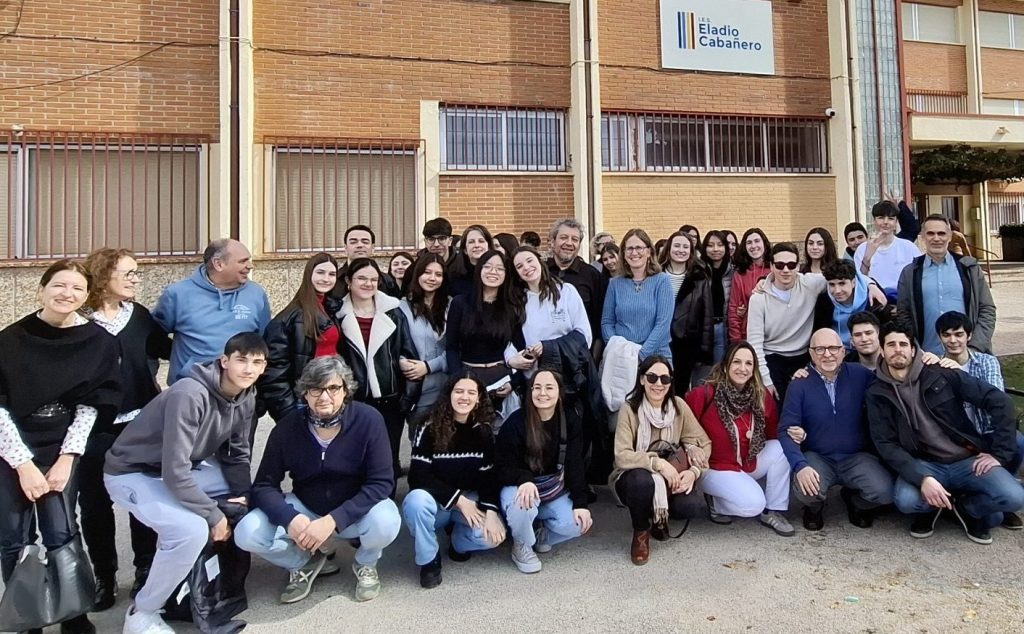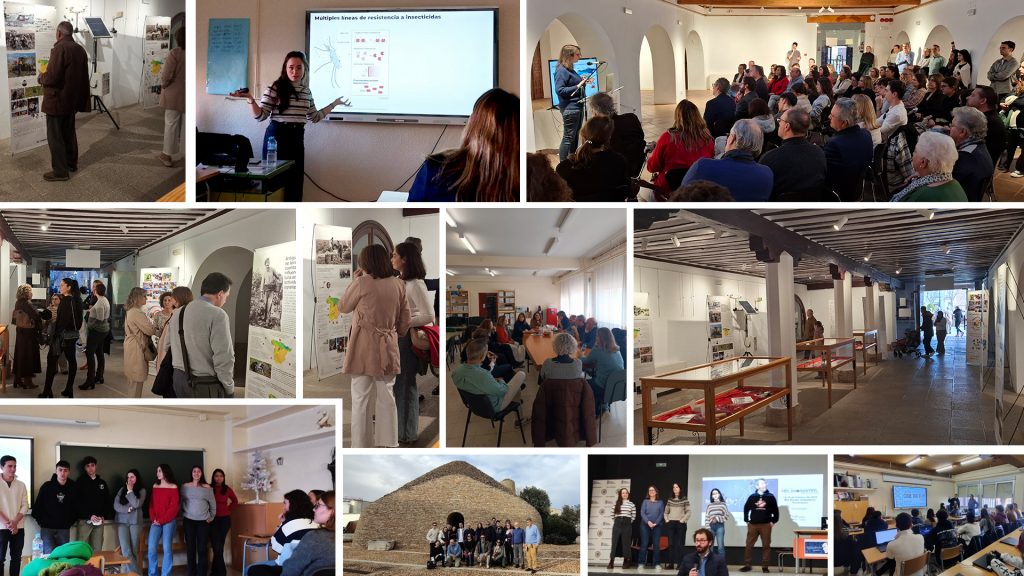

The fourth annual “Meet & Fly” meeting of “Melanogaster Catch The Fly!” (MCTF), the international citizen science network in adaptation genomics, which brings together scientists, students and teachers from various schools in Spanish and international communities, closed its fourth edition last weekend with the inauguration of the exhibition “Time Flies!, observing our history and relationship with biodiversity”.
This event, which was held on February 14 and 15, 2025 at the IES Eladio Cabañero in Tomelloso, where educational centers from Ciudad Real, Valencia, Navarra and Granada met, served as a space for exchange and reflection on advances in research into the impact of climate change on the genetics and evolution of Drosophila melanogaster.
The days included a multitude of different activities exclusively for MCTF participants such as scientific talks and immersive workshops by important speakers such as:
- “Transposable elements in the function of the genome”
Josefa González, Principal Investigator, Functional Genomics Laboratory, Botanical Institute of Barcelona (IBB, CSIC-CMCNB) and co-founder of the European Population Genomics Consortium (DrosEU).
- Code The Fly: “Immersive Bioinformatics Workshop” (6 hours)
Sònia Casillas, Associate professor and researcher at the Autonomous University of Barcelona (UAB). - “Combating mathematical-statistical illiteracy”
Raquel Villacampa, Mathematician, professor, and researcher at the University of Zaragoza. - “Track The Fly”
- The effect of climate change on biodiversity
- Drosophila as environmental indicators
- Access to public databases on environmental indicators
- Analysis, data visualization and hypothesis generation
Marta Coronado, Postdoctoral Researcher Gonzalez Lab at the Institut Botànic de Barcelona (IBB, CSIC-CMCNB).
- Adaptation to urban environments in malaria-transmitting mosquitoes
Marta Coronado, Postdoctoral researcher Gonzalez Lab (IBB, CSIC-CMCNB). - Citizen Fly Lab: “Molecular biology activities of students and teachers from Germany”.
MelanogasterCTF partners in Germany: Christian Feller and his students, from Sankt Afra High School (Meißen, Germany).
The event concluded on Saturday 15 February with two activities open to the public that took place at the Posada de los Portales in Tomelloso. At 6:00 p.m., Josefa González (IBB, CSIC-CMCNB) gave a presentation on collaborative science and adaptation of organisms to the environment. Later, at 6:30 p.m., the exhibition “Time Flies!; observing our history and relationship with biodiversity” was inaugurated. The opening ceremony was attended by the Director of the IES Eladio Cabañero, the mayor of the city, Javier Navarro and the councillors for Culture and Education, Inés Losa and Antonio Calvo.

“I think that for the kids it is an experience of getting closer to the scientific world. They have lived with and received talks from leading research scientists, and I think that this brings them closer to a reality that they see as very far away”
José Andrés Casas, profesor del Col·legi Mare de Deu de l’Olivar II de Valencia
“Time Flies!” is a new initiative of the MCTF project that seeks to integrate “Local Knowledge” and “Collective Memory” of people working in the field, with the work of European students, teachers and scientists, to enrich research on the impact of climate change on local and global biodiversity. The aim of this fusion is to obtain new perspectives and interpretations thanks to the daily work and observations of citizens in the rural environment, with an enormous potential to enrich scientific knowledge in adaptation genomics.
“This program has been very interesting for us as students, it has been enriching and we have learned a lot about science (…) and it has also helped us to value what we have on our land, based on the research we have done on agriculture.”
IES Benjamín de Tudela Student
The Meet and Fly! activities and the “Time flies!” exhibition in Tomelloso are part of the citizen science project Melanogaster Catch The Fly! (MCTF), organized by the Laboratory of Evolutionary and Functional Genomics of the Institut Botànic de Barcelona (CSIC – CMCNB), the scientific outreach platform La Ciència Al Teu Món (LCATM), and the Universitat Autònoma de Barcelona (UAB). MCTF has the collaboration of the Spanish Foundation for Science and Technology – Ministry of Science and Innovation (FECYT), the European Consortium for Drosophila Population Genomics (DrosEU), the European Research Council (ERC), the IES Eladio Cabañero, the Tomelloso City Council and Vinícola de Tomelloso. The Ramón y Cajal High School in Granada, the Benjamin Secondary School in Tudela, the Mare de Deu de l’Olivar II School in Valencia, the José de Mora High School in Baza and the Azuer High School in Manzanares participated.

